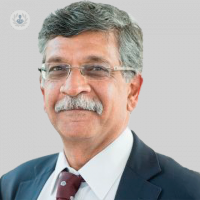Do I have Guillain-Barré syndrome?
Written by:Guillain-Barré syndrome is a relatively rare but often serious condition which affects your nervous system. Dr Hadi Manji, a renowned senior consultant neurologist, describes the symptoms, causes and treatment options of this disorder.

What is Guillain-Barré syndrome (GBS)?
Guillain-Barré syndrome is a neurological disorder that affects the peripheral nervous system (nerves outside the brain and spinal cord) by causing inflammation of nerves (both sensory and motor).
How common is Guillain-Barré syndrome?
The incidence rate is around 1 – 2 per 100,000 of the population – so in the UK one might expect 1300 cases a year. However, epidemics may occur for example after the South American Zika virus epidemic in 2016.
What causes Guillain-Barré syndrome?
The usual trigger for GBS is an infection of which the most common are:
- Campylobacter jejuni (which causes a diarrhoeal illness)
- Epstein Barr virus (EBV) which causes a respiratory tract infection
- Mycoplasma pneumoniae (causes a chest infection)
There is an ongoing debate as to whether COVID-19 could also be a cause of GBS.
The way infections trigger GBS is that the body produces antibodies against the infection. These antibodies then mistakenly attack the nerves, as there are common molecules on the surface of both the infective agent and the nerve.
Who is most at risk of having Guillain-Barré syndrome?
There are no real risk populations – anyone can get GBS - old and young. The elderly are more likely to suffer serious complications.
What are the symptoms of Guillain-Barré syndrome?
There are a variety of presentations, including the development of weakness of the feet and legs which gradually involves the arms. In more serious cases swallowing and breathing are affected. Often, other symptoms including pins and needles and back pain are also present.
In a specific type of GBS called Miller Fisher Syndrome (MFS), patients experience double vision and difficulty with coordination.
How quickly do Guillain-Barré syndrome symptoms develop?
GBS develops over days, but occasionally can progress rapidly over hours. In these cases, it should be treated as a medical emergency and patients should be seen as soon as possible.
What happens if Guillain-Barré syndrome isn't treated?
Sometimes, in mild cases, patients can get better without any treatment but as it is a very unpredictable condition with potentially serious complications, it is advisable to be seen by a medical specialist urgently. Complications include heart and blood pressure problems, difficulty breathing and swallowing which are all very serious. Some patients will require treatment in an Intensive Care Unit (ICU) because of breathing problems requiring ventilation.
What tests will be done to confirm a diagnosis of GBS?
The most important step is to be seen by a specialist in the first instance. They will then inform you of the next steps which usually include MRI scans, blood tests, electrical tests called nerve conduction and EMG. Usually, it is necessary to perform a lumbar puncture to examine the cerebrospinal spinal fluid (CSF), which can help determine the cause of the GBS.
What is the treatment for Guillain-Barré syndrome?
The main treatment option is a blood product called immunoglobulin, which is injected into the veins over 5 days. It is a’ soup’ of antibodies collected from blood donors to counteract the effect of the damaging antibodies.
An alternative treatment is plasma exchange where a patient’s blood is passed through a machine to wash out the damaging antibodies, before being put back into the blood. Serious cases where swallowing or breathing is affected are monitored and treated in the intensive care unit.
Other aspects of treatment include prevention of clots, treating pain, avoiding constipation and specialist neuro-physiotherapy.
Dr Hadi Manji is a senior consultant neurologist at the National Hospital for Neurology. You can request an appointment by visiting his Top Doctors profile.


